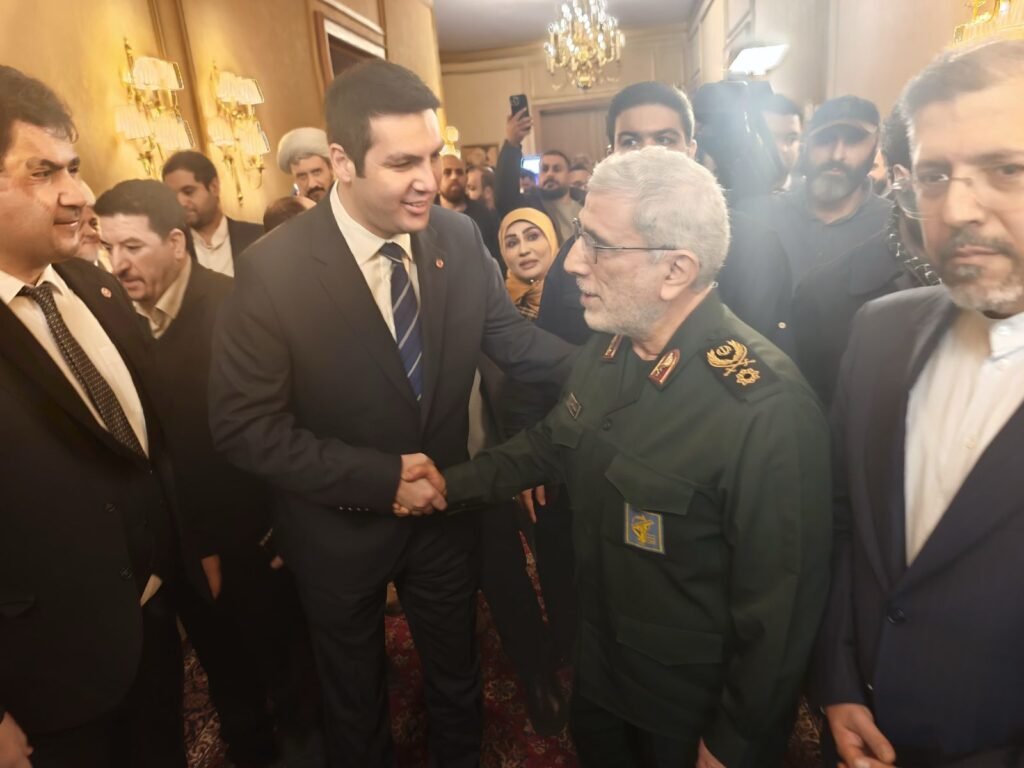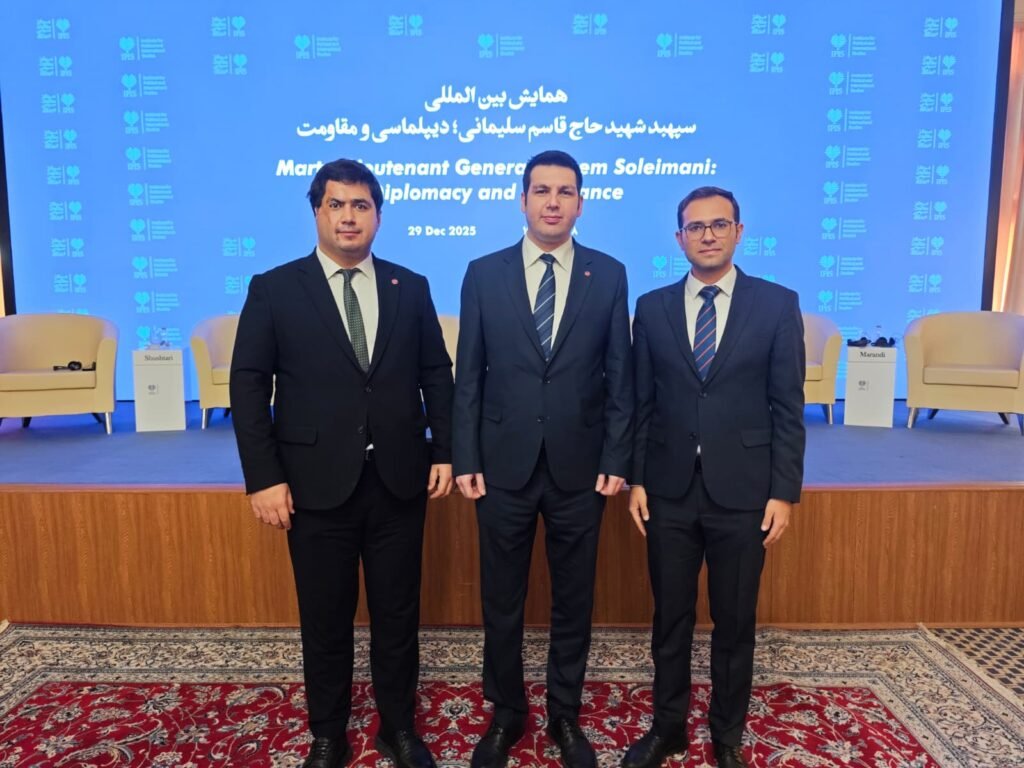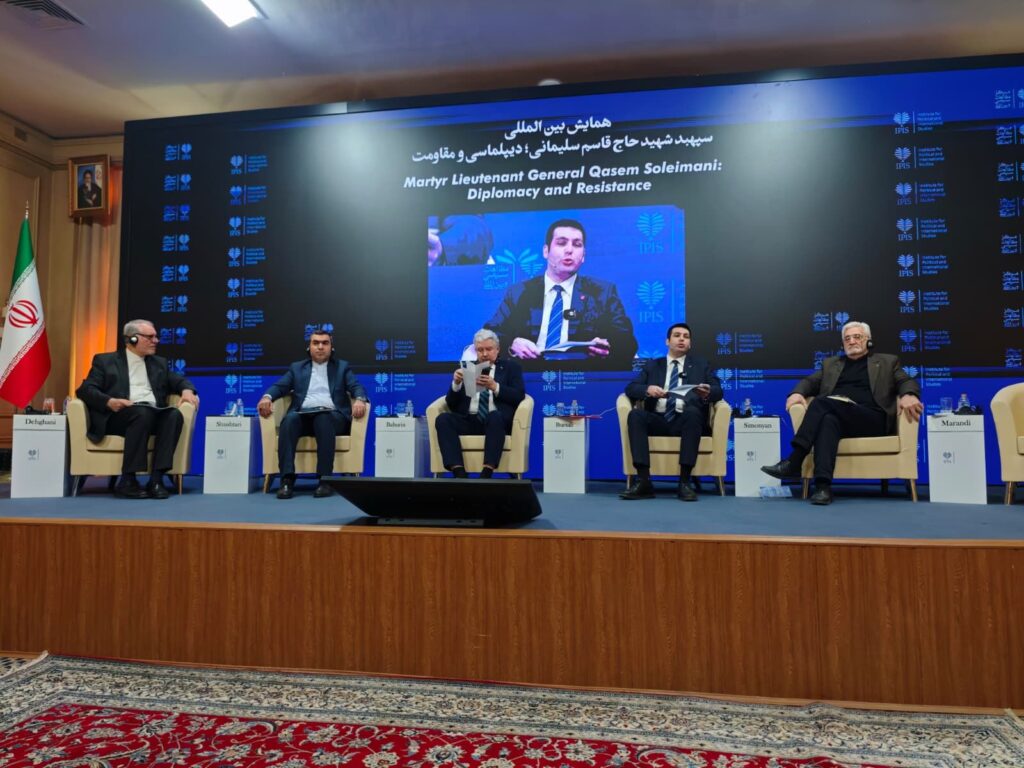Vatan Partisi Genel Sekreteri Özgür Bursalı ve Genel Başkan Yardımcısı Ferdi Tanhan, İran’da düzenlenen ‘’Şehit Korgeneral Kasım Süleymani: Diplomasi ve Direniş’’ başlıklı uluslararası konferansa katıldı.
İran Dışişleri Bakanı Abbas Erakçi, Kudüs Gücü Komutanı General İsmail Kaani ve çok sayıda İran devlet yetkilisinin katıldığı Tahran’da düzenlenen ‘Şehit Korgeneral Kasım Süleymani: Diplomasi ve Direniş Uluslararası Konferansı’nda Türkiye’den bir tek Vatan Partisi Genel Sekreteri Özgür Bursalı konuşma yaptı.
Dışişleri Bakanı Erakçi’nin açış konuşması yaptığı konferansa Bakan Yardımcısı, Ortadoğu Genel Müdürü, Özel Temsilciler ve Zeynep Süleymani katıldı. Birçok davetlinin olduğu konferansta Vatan Partisi’ne ilgi büyük oldu.
Bursalı, konuşmasının sonunda Firdevsi’nin ”Şehitler, mezarlarınızdan kalkmanın vaktidir” şiirini okudu ve salondan büyük alkış aldı.
Bursalı ayrıca İran DMO Kudüs Gücü Komutanı General İsmail Kaani ile konferans arasında bir araya geldi.

Özgür Bursalı’nın İran Dışişleri Bakanlığındaki konferansta yaptığı konuşmayı sizlere iletiyoruz.
Sayın Bakan,
İran İslam Cumhuriyeti’nin Değerli Yöneticileri,
Değerli Konuklar,
Ben Özgür Bursalı, Türkiye Vatan Partisi’nin Genel Sekreteri olarak sizleri saygıyla selamlıyorum.
Genel Başkanımız Sayın Doğu Perinçek’in saygılarını ve başarı dileklerini iletiyorum.
Öncelikle büyük kahraman Şehit Kasım Süleymani’nin aziz hatırasını saygıyla anıyoruz. O’nun ABD emperyalizmine ve İsrail Siyonizmine karşı kararlı mücadelesi, bizlere en büyük mirastır. Kasım Süleymani yalnız İran’ın değil, Batı Asya’nın, Türkiye’nin ve bütün insanlığın şehididir. Bir Kasım Süleymani şehit oldu, şimdi binlercesi yeniden doğdu. Biz O’nu yüreğimize gömdük ama O’nun davası devam ediyor.Bu inanç ve sorumlulukla önümüzdeki görevleri saptıyoruz.
***
Yeni bir dünya doğuyor. Yeni bir yılın değil, yeni dünyanın eşiğindeyiz.
İkinci Dünya Savaşından sonra kurulan ABD hegemonyasının sonuna gelmiş bulunuyoruz. Atlantik çağı sona erdi, Asya çağı yükseliyor.
Bizler, ön cephede, İran, Türkiye, Rusya, Filistin, Yemen olarak, yeni dünyanın kuruluşunda öncü konumlardayız.
Artık hiçbir şiddet, hiçbir terör, başında ABD’nin bulunduğu Atlantik sistemini ve İsrail’i kurtaramaz.
Dolar saltanatı çöküyor. Emperyalistlerin ekonomileri için tehlike çanları çalıyor. Atlantik sistemi insanlığa çürümekten başka hiçbir şey vermiyor.Emperyalistler ve Siyonistler her cephede yeniliyor.
Mazlum milletler ayağa kalkıyor, Milli Devletler direniyor.
İran, İsrail siyonizmine karşı kahramanca direniyor ve kazanıyor. 12 Gün Savaşı’nda İran, bütün dünyaya İsrail siyonizminin kâğıttan bir kaplan olduğunu göstermiştir. İnsanlığa umut olmuştur. Şehit Komutanlarımız Muhammed Bakırileri, Hüseyin Selamileri saygıyla anıyoruz.
Rusya, Ukrayna cephesinde, bütün insanlık adına Batı emperyalizmiyle savaşıyor ve kazanıyor.
Lübnan’da Hizbullah, Şehit Nasrallah’ın mirasıyla direniyor. Venezuela direniyor.
Şimdi önümüzde büyük zorluklar var.
Karadeniz’den, Ege’ye, Doğu Akdeniz ve Suriye’nin kuzeyinden, Filistin’e, Fars Körfezi ve Hürmüz Boğazı’na kadar tek bir cephe vardır.
Her parça birbirinden ayrı gibi gösterilebiliyor, ancak hepsi ABD emperyalizmi ve İsrail siyonizmine karşı tek cephede birleşiyor. Bizim cephemiz de, Milli Devletlerimizi savunma ve insanlık cephesidir.
Türkiye, İran, Rusya ve Filistin’in kaderi ortaktır. Bizler cephe arkadaşıyız.
İran’ın güvenliği, Türkiye’den, Kıbrıs’tan ve Doğu Akdeniz’den başlar. Türkiye’nin güvenliği de İran’dan başlar.
Sizlerin yüksek dikkatinize sunuyorum: Doğu Akdeniz şu an ülkelerimize yönelen tehditlerin odağıdır.
Doğu Akdeniz’de ABD-İsrail ve Yunanistan’ın yaptığı NEMESİS ve NOBLE DİNA adlı “İntikam” konulu tatbikatlar, Güney Kıbrıs’a yapılan silahlı yığınaklar, Ege Adalarındaki ABD’nin askeri üsleri, hepimizi hedef almaktadır.
Güney Kıbrıs yöneticileri, İsrail’e Yunanistan’dan daha çok güvendiklerini ilân ediyorlar.
Suriye’nin kuzeyinde, Kürdistan adı altında İkinci İsrail kurmak isteyenler, hepimizi hedef almaktadır. İkinci İsrail kurulursa, Filistin Kaybeder. Filistin kazanırsa İkinci İsrail kurulamaz.
İran’ı, Rusya’yı, Çin’i dışlayarak, Filistin’i silahsızlandırarak barış olamaz. Bu yüzden Trump ve Netanyahu barışı başarısızdır. Kimse Filistin’in silahını elinden alamaz.
***
İşte bu koşullarda, Türkiye, Rusya, İran, Çin ittifakı, bu büyük tehditlere karşı zorunludur. Bu ittifak şimdi Türkiye’yi yöneten güçlerin de gündemine girmiştir.
Bu, Vatan Partisi’nin başarısıdır.
Küresel güçlere karşı ancak güçlerimizi birleştirirsek karşı koyabiliriz. Güçler arasındaki dengesizlik, savaş tehlikesi getirir. Doğu Akdeniz’de dengesiz bir durum vardır. Türkiye, Rusya, İran, Çin ittifakı dengeleri değiştirir, küresel tehdidi caydırır.Bu beraberliği kurmamız lazım. İran, Rusya ve Çin’in Doğu Akdeniz’de, Türkiye ile beraber olması lazım.
Şimdi Türkiye, Atlantik sisteminden kopma sürecindedir.
Türkiye’ye güvenin. Türkiye’nin tarihine, birikimine, halkına güvenin. Vatan Partisi’ne güvenin.
15 Temmuz darbe girişiminden sonra NATO’cu Generaller Türkiye hapishanelerinde yatmaktadır. 24 bin Amerikancı subay Türk Ordusundan temizlenmiştir. 150 Bin FETÖ unsuru, Türk Devletinin içinden atılmıştır. ABD, Türkiye’de silahsızlandırılmıştır. Ekonomide ve güvenlikte Türkiye büyük bir kararın, köklü değişikliğin eşiğindedir.
Türkiye’yi bu büyük değişikliğe Vatan Partisi getirmiştir.
40 Yıldır Avrasya ittifakını savunuyoruz. Şimdi bu program, ABD-İsrail belasına karşı tek seçenektir.
21. Yüzyıla bizlerin beraberliği hem siyasette, hem ekonomide hem de güvenlikte, dünyaya damgasını vuracaktır.
Birliğimizi bozan, mezhepçi bakış açıları ancak ABD ve İsrail’e yarar.
Dayanışmamızı güçlendirmemiz, stratejik işbirliğini yükseltmemiz şarttır. Kaşgarlı Mahmut’un dediği gibi, “Baş börksüz, Fars Türksüz olmaz.” Birbirimize güveniyoruz.
Türkiye, yükselen Asya Uygarlığındaki kararlı yerini kesinlikle alacaktır. Vatan Partisi’nin hükümet konumlarında olacağı Türkiye’den size müjdeler vereceğiz.
Bize ait olan ve Türkiye’de kararlı dostunuz olan Televizyon Kanalımız, Ulusal Kanal, son 3 ayda 604 Milyon kez izlenerek Türkiye’nin dijitalde en çok izlenen Haber Kanalı olmuştur.
12 Gün savaşında medya organlarımız, İran’daki Temsilcimiz Gürkan Demir sayesinde Türk milletine gerçekleri aktarmıştır.
Türk halkındaki İran, Rusya, Çin ve Asya dostluğu yükselen değerdir.
Türk üreticisi ve sermayesi yüzünü Asya’ya dönmüştür.
Bu gelişmeler de geleceğe güvenle bakmamızı sağlıyor.
Şairlerin en büyüğü Firdevsi’nin Şahnamede, “Şehitler mezarlarınızdan kalkma vaktidir.” diyordu.
Batı Asya’nın şehitlerine sesleniyoruz. Türkiye’nin, İran’ın, Filistin’in, Irak’ın, Suriye’nin, Yemen’in, Arap dünyasının, Fas’ın, Cezayir’in şehitlerine sesleniyoruz: Şehitler mezarlarınızdan kalkma ve İsrail’i tepelemenin vaktidir.
Sizlere güveniyoruz.
Bu umut ve güvenle, toplantı için teşekkür ediyorum.
Saygılarımla.




